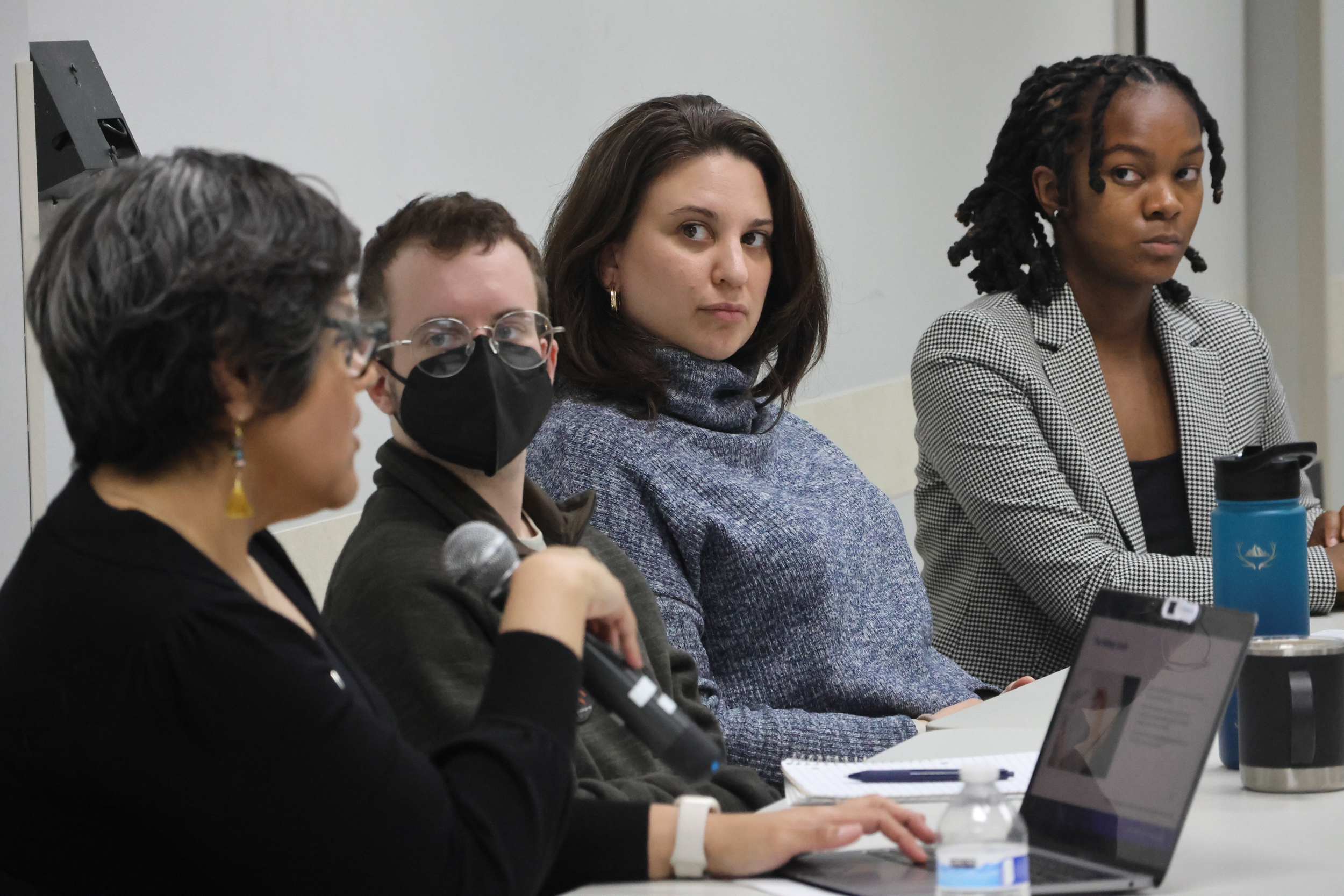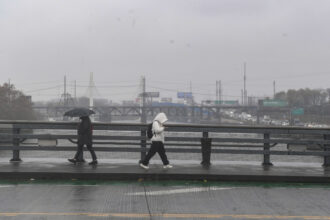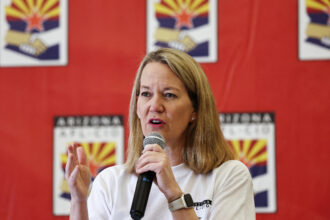On Sunday Chicagoans will face another spike in their water bills after seeing rates more than double over the past 15 years.
The latest increase—4 percent—comes as environmental justice groups are fighting for more water-affordability protections.
“Water is just as important as energy,” said Iyana Simba, city government affairs director at the Illinois Environmental Council. “If we don’t have water, we don’t have life. So for us, we want to draw attention to the things that are affecting our water.”
Water advocates gathered on Chicago’s South Side last week to offer solutions to the affordability crisis in the first of a series of “Water Matters” town hall events. Hosted by the Illinois Environmental Council, Water Matters is a convening space for water experts to provide assistance to Illinois homeowners and renters struggling with water bills as well as to push for action by lawmakers.
A report by Elevate, a Chicago-based nonprofit focused on creating equitable clean energy solutions, and the Metropolitan Planning Council found that water bills ate up almost 10 percent of income for Chicago’s lowest-income households in 2019. The city’s rate, $36.51 per 1,000 cubic feet of water as of Sunday, is up nearly 23 percent since then.
Staffers at Southsiders Organized for Unity and Liberation (SOUL) have spoken with residents on the far South Side about exponentially increasing water bills, even as their usage remains the same month over month.
“We were seeing bills rise from like $200 bi-monthly to $2,000 bi-monthly,” said Oliver Ciciora, a SOUL environmental justice organizer. “I know people that have it up to $60,000 for a less than five-unit household that’s a completely vacant property.”
Rates aren’t the only factor. Water loss due to leaky pipes and the cost of replacing lead lines and other deteriorating pipes also play a role, according to the Citizens Utility Board, the state-created nonprofit utility customer advocate.
Leaky pipes cause millions of dollars in water loss each year, and lead lines can cost upward of $30,000 per replacement, said Anna-Lisa Gonzales Castle, director of water policy at Elevate.
Although water infrastructure improvements are necessary, Gonzales Castle is concerned that residents are fronting the bill for a problem that’s not theirs to solve.
“What we want to see is when these rate increases happen,” Gonzales Castle said, “that, yes, we’re investing in our water systems, but we’re not doing it on the backs of the people who can’t afford it.”
Seeing an urgent need to convene on water affordability in Chicago, SOUL created the Water for All Coalition in 2016, convening 40 Chicago-based organizations to push for the utility billing relief program, which has since provided low-income homeowners with reduced rates on their water bills and some debt forgiveness.
Now, Ciciora is fighting to get a Water for All bill before the City Council to expand water affordability to more Chicagoans.
“We need this to happen because every day that this doesn’t pass is a day that people can’t afford the bills,” Ciciora said. “Which means every day people are burdened by water debt.”
Federal funding for the Low Income Household Water Assistance Program, which helped people around the country with high water bills, ended in 2023. Since then, groups like SOUL have pressed the city to expand its utility-help program to make up for gaps in low-income water assistance.
“In Chicago, we have $780 million in water debt currently. That’s money the city is just not receiving at all.”
— Oliver Ciciora, Southsiders Organized for Unity and Liberation
Water for All, the newest effort, has three specific goals: Make more low-income homeowners eligible for water assistance, allow low-income renters to access the help as well and ban home liens and foreclosures due to water debts.
“Right now in the city, there has been a ban on water shutoffs and a ban on water privatization for the last two years, which is amazing,” Ciciora said. “But there isn’t a ban on liens and foreclosures, so if I can’t pay my water bill, I can still lose my home, which is really unacceptable.”
Ciciora said the Water for All proposal is modeled after water assistance programs in other U.S. cities, like Philadelphia and Baltimore, with comparable rental rates to Chicago. Successful programs can produce more money for cities, Ciciora said, because they help residents begin to pay off water debts.
“In Chicago, we have $780 million in water debt currently,” Ciciora said. “That’s money the city is just not receiving at all. When there’s this [water assistance] program, the city starts making money again. We know this is working in other cities that have similar issues and demographics as Chicago, and we know it works. Let’s do it.”
At the Water Matters town hall, Ciciora urged participants to sign a petition asking Mayor Brandon Johnson to call for a vote on a Water for All ordinance. Ciciora said the mayor’s office has not been supportive, citing concerns about cost and equity.
The mayor’s office did not respond to requests for comment about the matter.
“We did not get a clear answer as to why [Water for All] was inequitable, because this mostly applies to South and West Side neighborhoods, which we know are majority Black and brown, and we cannot get more equitable than providing relief to low-income Chicagoans that are in those neighborhoods,” Ciciora said.
The Water for All Coalition plans to put pressure on the city over the summer with more public convenings around water affordability reforms.
“They need to be pushed, because there’s a lack of political will to do this,” Ciciero said. “We need movement.”
Correction: This story was updated June 11, 2025, to correct Iyana Simba’s title.
About This Story
Perhaps you noticed: This story, like all the news we publish, is free to read. That’s because Inside Climate News is a 501c3 nonprofit organization. We do not charge a subscription fee, lock our news behind a paywall, or clutter our website with ads. We make our news on climate and the environment freely available to you and anyone who wants it.
That’s not all. We also share our news for free with scores of other media organizations around the country. Many of them can’t afford to do environmental journalism of their own. We’ve built bureaus from coast to coast to report local stories, collaborate with local newsrooms and co-publish articles so that this vital work is shared as widely as possible.
Two of us launched ICN in 2007. Six years later we earned a Pulitzer Prize for National Reporting, and now we run the oldest and largest dedicated climate newsroom in the nation. We tell the story in all its complexity. We hold polluters accountable. We expose environmental injustice. We debunk misinformation. We scrutinize solutions and inspire action.
Donations from readers like you fund every aspect of what we do. If you don’t already, will you support our ongoing work, our reporting on the biggest crisis facing our planet, and help us reach even more readers in more places?
Please take a moment to make a tax-deductible donation. Every one of them makes a difference.
Thank you,











